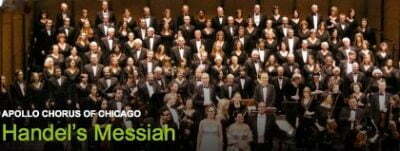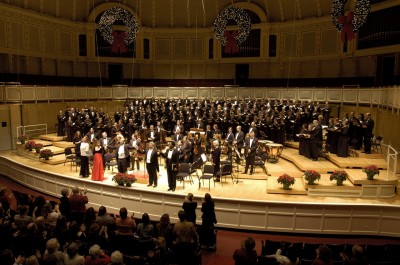Messiah
Conducted by Stephen Alltop
Produced by Apollo Chorus of Chicago
Apollo Praises Christ
The latest of the Chicago Christmas traditions I’ve had the pleasure of experiencing this season is the 143 year old Apollo Chorus’s 135th annual performance of Handel’s Messiah. The oratorio, written in the baroque style of 1741, is a combination of biblical passages that celebrate Jesus’s birth and rebirth. Though Handel had written mostly operas before, Messiah was destined to become his most acclaimed work through the centuries, and Apollo Chorus keeps it fresh for modern audiences.
Though the arrangement is probably old, a large part of what makes this performance successful is how conductor Stephen Alltop is able to scale up Handel’s chamber piece to the massive scale of Orchestra Hall, where I saw it, and the upcoming performance at the Harris. Handel was only writing for a chorus of a couple dozen, but the Apollo has over 110 singers. They are also joined by an orchestra of mostly modern string instruments, as well as a harpsichord (Jason Moy) and an old-fashioned organ (David Bachmann). And yet, the music is never overpowering. It is energetic without being rushed, and just loud enough you can hear every note without vibrations ringing in your ears or anything being drowned out.
Also onstage are four soloists, soprano Elisabeth Marshall, mezzo J’Nai Bridges, tenor Samuel Levine, and bass David Govertsen. Handel took care to balance the soloists with the chorus, so they feel equally important. But the soloists are all excellent. I especially enjoyed Govertsen’s rich “But Who May Abide?” which established a bit of drama early in the oratorio, and Bridges’s “He Was Despised and Rejected” in the second part. Marshall was lovely in “Rejoice Greatly, O Daughter of Zion,” and Levine’s duet with Bridges near the end of the oratorio’s third part helped prevent it from seeming anticlimactic. The best known chorus song, “Hallelujah” occurs at the end of the second of the three parts, and while the boys’ choir version hits my eardrums like glass shards, Apollo made it warm and joyous. I was pleasantly surprised.
I am not trained in classical music, but I do not think that the Apollo Chorus is volunteer detracts from its performance. Many people are talented in the arts, but for whatever reason choose not to make a career of it. Certainly a professional chorus could not have been nearly as large, and so would have had a substantially different sound. What I saw from Apollo made use of their power to fill a massive space without sacrificing nuance. In any case, the soloists and musicians have considerable credentials. Handel’s baroque style includes going through scales constantly, which is a matter of taste. But for fans of this work, or people who have seldom heard baroque and are curious, the music and atmosphere of Apollo’s Messiah continues to provide the best opportunity to hear it this time of year.
Highly Recommended
Jacob Davis
December 20 performance will be at Harris Theater for Music and Dance, 205 East Randolph Drive, Chicago. Starting time is 3:00 pm. Call Harris Theater at 312-294-3000 or Apollo Chorus at 312-427-5620 or visit www.apollochorus.org. Tickets are $30-60. Running time is two and a half hours with one intermission.


